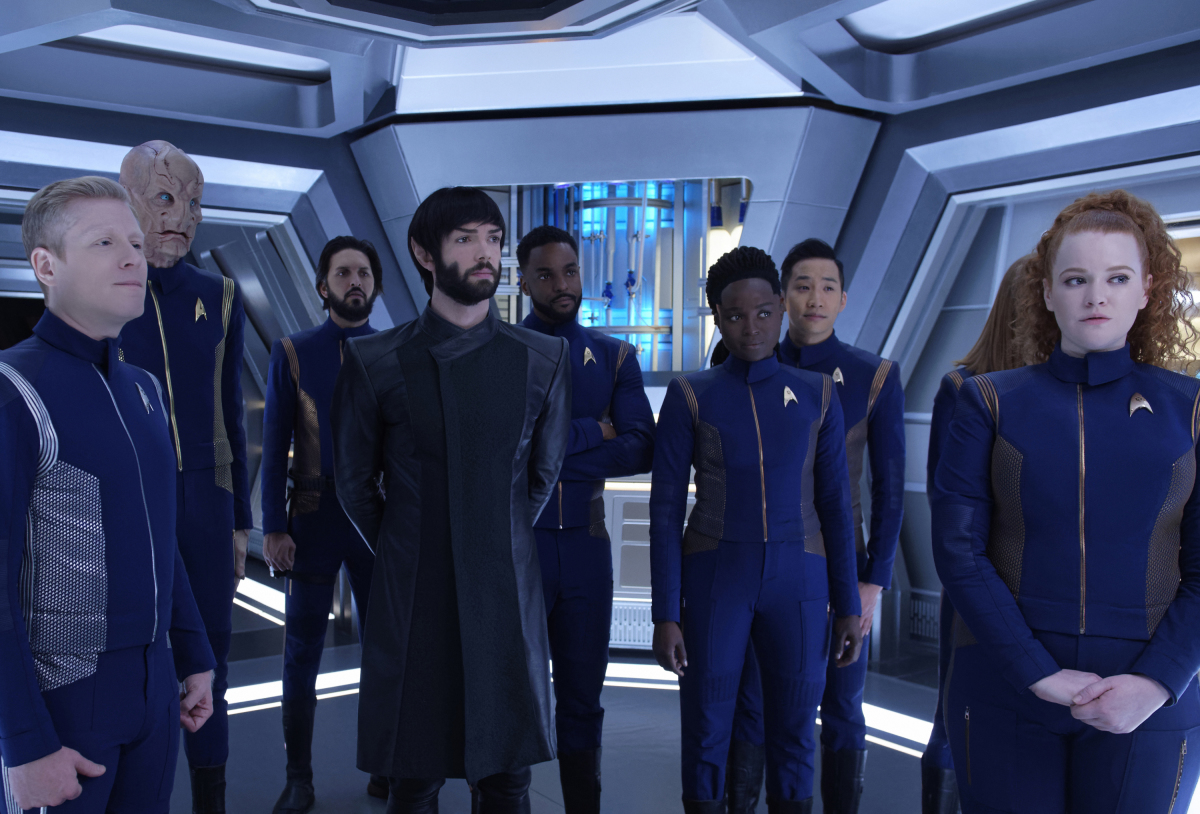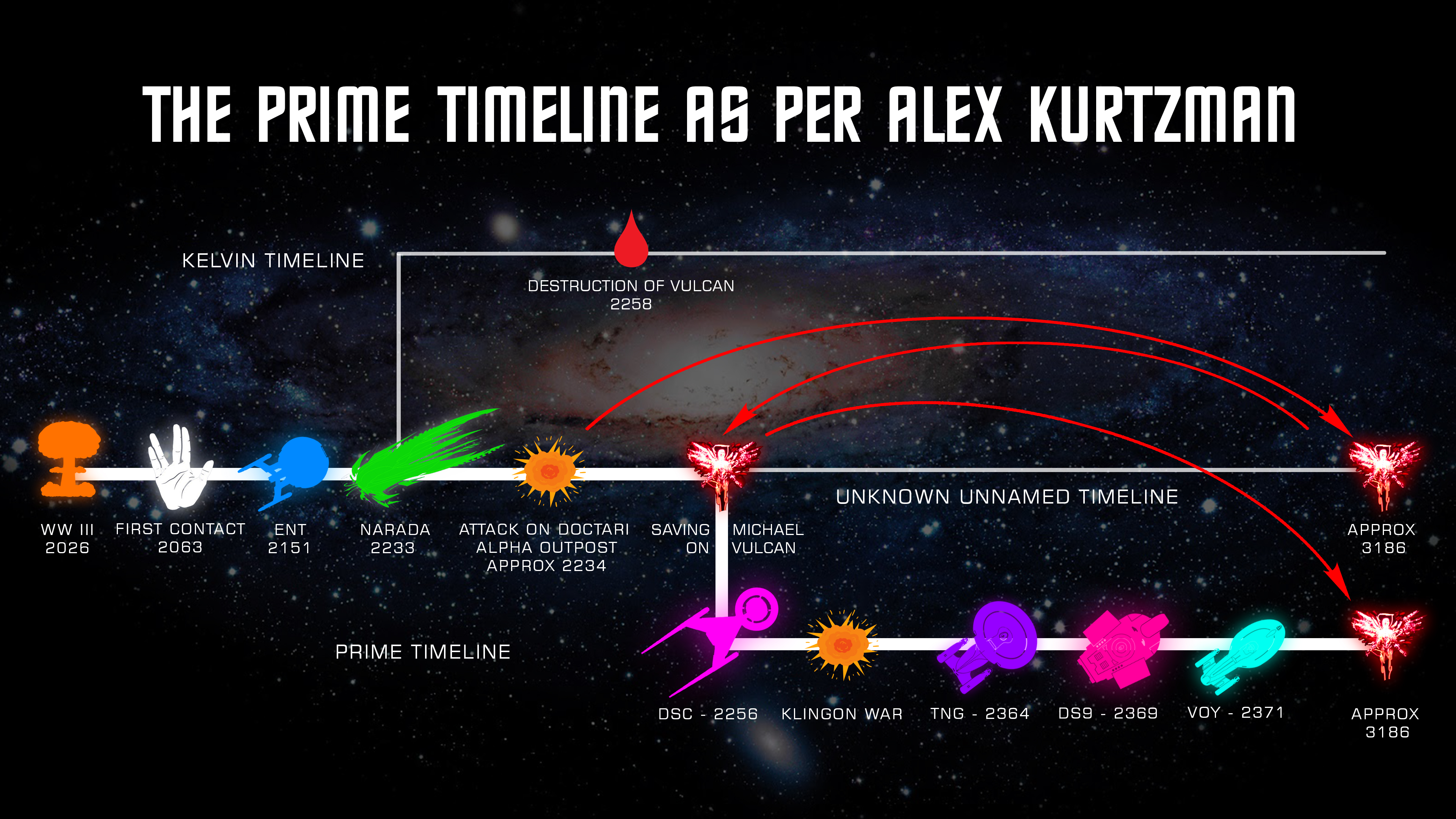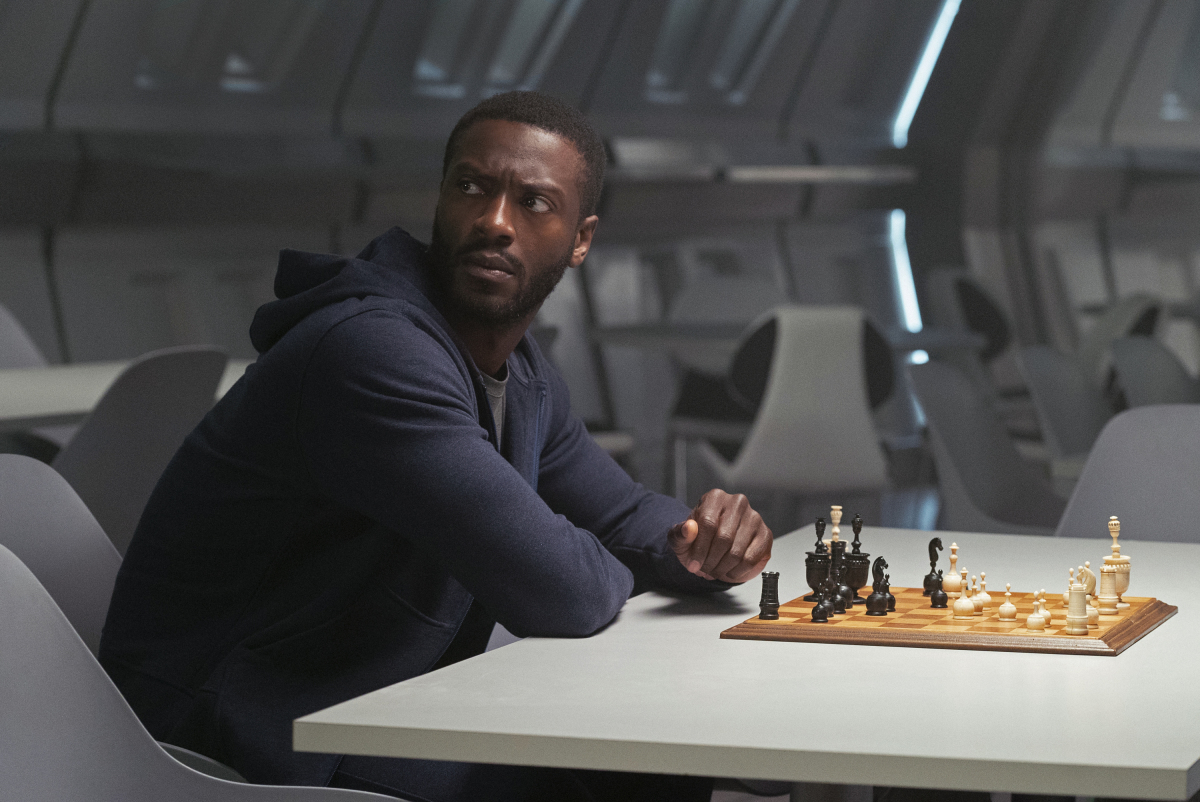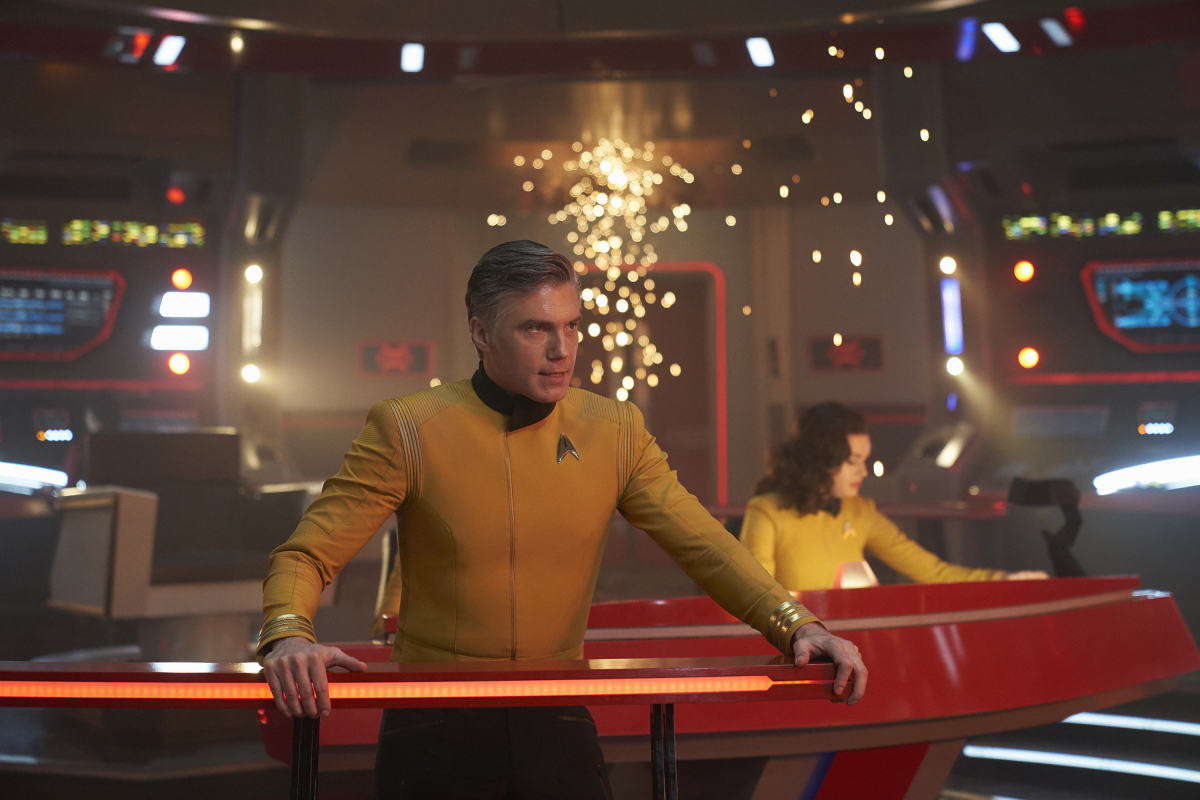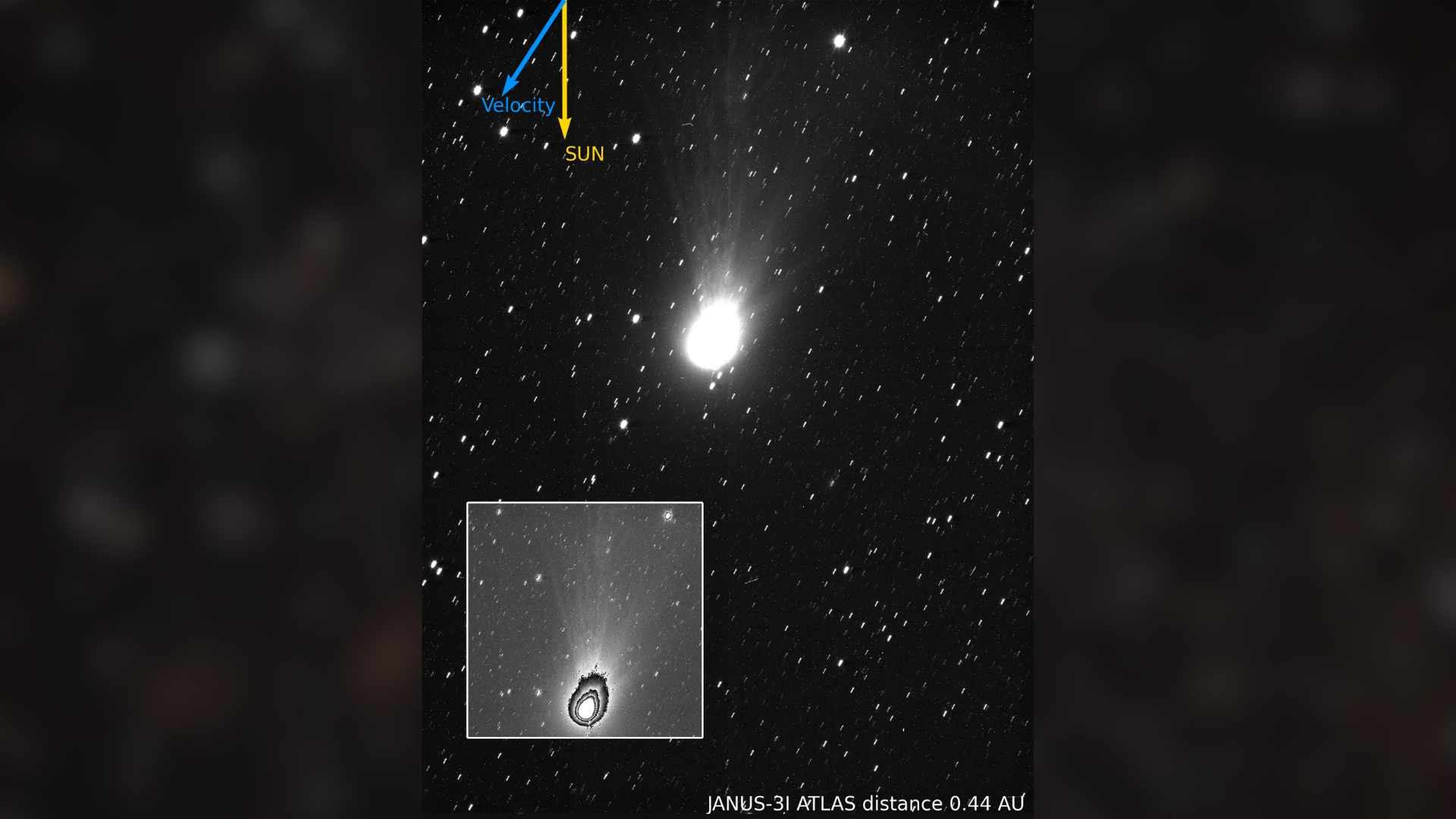'Star Trek: Discovery' Season 3: What We Know and What We Hope For
The third season will be set 950 years in the future.
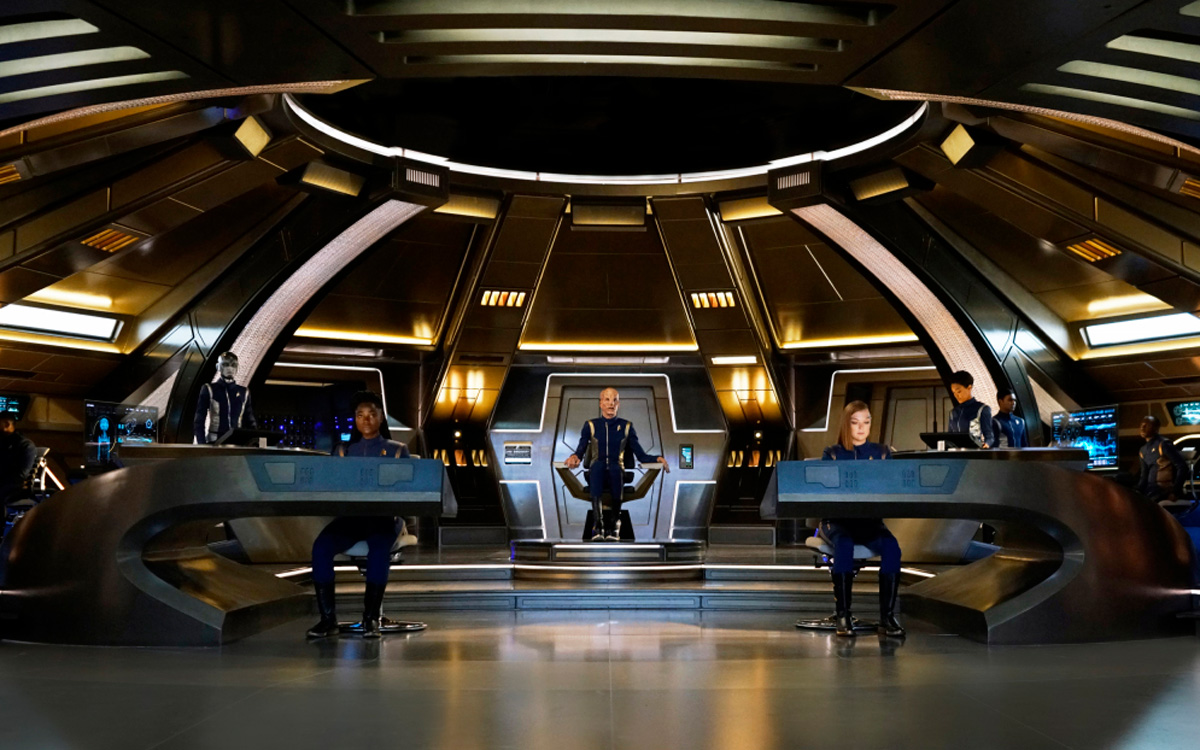
Breaking space news, the latest updates on rocket launches, skywatching events and more!
You are now subscribed
Your newsletter sign-up was successful
Want to add more newsletters?
"Star Trek: Discovery" Season 2 spoilers ahead.
The Season 2 finale of "Star Trek: Discovery" left us scratching our heads somewhat — after a one-way trip through a time wormhole to place a dangerous collection of data out of harm's way, the USS Discovery now appears to be trapped 950 years in the future.
In the final moments of that episode, "Discovery" stopped being a prequel to "The Original Series" and instead became the farthest future-flung series in the history of the franchise chronology, rocketing past the events of "The Next Generation," "Deep Space Nine" and "“Voyager," all of which take place in the 24th century and arriving at the end of the 32nd century, in the year 3187.
Related: 'Star Trek: Discovery' Actor Rekha Sharma Teases Her Role in 'Star Trek Online'
Compare that to the few decades' difference between "The Next Generation" and the new Jean-Luc Picard series, or the single century between "Enterprise" and "The Original Series." Now we potentially have a new, 14- or 15-episode story arc set nearly a millennium after the events of "Deep Space Nine" and "Voyager."
This certainly raises a few questions and offers some interesting potential routes for the series to travel next.
What we know
Who's on board the Discovery that we know of? Cmdr. Michael Burnham (Sonequa Martin-Green), Cmdr. Saru (Doug Jones), Lt. Cmdr. Paul Stamets (Anthony Rapp), Ensign Sylvia Tilly (Mary Wiseman), Dr. Hugh Culber (Wilson Cruz), Cmdr. Nhan (Rachael Ancheril), Lt. Nilsson (Sara Mitich), Lt. Keyla Detmer (Emily Coutts), Lt. Gen Rhys (Patrick Kwok-Choon), Lt. Joann Owosekun (Oyin Oladejo), Lt. R.A. Bryce (Ronnie Rowe), Philippa Georgiou (Michelle Yeoh) and Jett Reno (Tig Notaro) are all on board.
Breaking space news, the latest updates on rocket launches, skywatching events and more!
Capt. Christopher Pike (Anson Mount), Lt. Spock (Ethan Peck) and Number One (Rebecca Romijn) are left behind aboard the USS Enterprise, back in the 23rd century. Finally, Agent Ash Tyler (Shazad Latif) is still serving with Section 31, and Admr. Cornwell (Jayne Brook) and Capt. Leland (Alan Van Sprang) are both deceased.
At the end of the episode, the crew of the Enterprise were debriefed by a faceless Federation official and, following a suggestion by Spock, were ordered to never under any circumstances discuss the subjects of the time suit, the spore drive, the Discovery and anything generally connected to recent events.
However, there were a few other witnesses: many Klingons, including L'Rell (Mary Chieffo) knew about the spore drive, and possibly the galactic grifter Harcourt Fenton Mudd (Rainn Wilson) did, too.
This ban on discussion allows the writers to bring everything back in line with canon. But it might not be so simple: Some believe that the events of "Star Trek: Discovery" — specifically young Burnham being saved at Vulcan's Forge by the appearance of her mother as the Red Angel to Spock — have unwittingly created a new timeline separate to the events we've already seen in "Star Trek: The Next Generation," "Star Trek: Deep Space Nine" and "Star Trek: Voyager." Others maintain that this time tangent is what actually created what's generally called the Prime Timeline.
Executive producer Akiva Goldsman, talking to Syfy.com, confirmed way back in 2017 that the series takes place in the Prime universe.
"It's not the J.J. [Abrams] verse or the Kurtzman verse," Goldsman said. "It is 10 years before TOS [The Original Series], so we are in a section of canon that has been referred to a lot."
So while the skew in the timeline was undoubtedly deliberate, how it unravels seems to boil down to how you interpret the season's events. This is what happens when you start introducing convoluted time travel plots into a story arc.
If the producers have intended for events of "Discovery" to create the Prime Timeline, then one can't help but think an opportunity was wasted. By being in an ever-so-slightly different "Burnham Timeline," there would have been no need to adhere 100% to canon and Kurtzman could've tweaked "Star Trek" in any way he wanted.
The new Burnham Timeline could've been almost identical to the Prime Timeline, with just a few teeny-tiny differences, much like when there's suddenly fish in Col. Jack O'Neill's pond where there weren't fish before the time-traveling tomfoolery of the excellent "Stargate SG-1" Season 8 two-part finale "Moebius" (S08, E20), or even what happens to Marty McFly at the end of "Back to the Future." There was an opportunity here to have a little fun with history, instead of forcing unbelievable events on us while trying to maintain some sort of conformity with established history.
Shortly after the season finale, showrunner Alex Kurtzman gave a lengthy interview with The Hollywood Reporter in which he was asked if it was safe to assume that Season 3 will follow the USS Discovery away from the present timeline.
"Yes. We are jumping 950 years into the future for season three," he told The Hollywood Reporter.
So it certainly sounds like the majority, at least, of Season 3 will be set in the 32nd century, 950 years in the future.
We also know that a Jean-Luc Picard spinoff series is currently filming and a Philippa Georgiou series seems to still be going ahead. So it's more than likely there will be references to those in "Star Trek: Discovery" and vice versa.
"Calypso"
We also know that the "Short Trek" episode "Calypso" was set at some point during the 33rd century. At some point, the USS Discovery was abandoned in an ion storm and a quite charming artificial intelligence named Zora took up running the ship.
The episode's writer, Michael Chabon, confirmed on Instagram that the name for the spacefaring civilization in that plotline, "V'draysh," is a syncope (the omission of sounds or letters from within a word) of "Federation." V'd-ray-sh — Fed-ra-tion. This admission, and the fact that we learn the V'draysh valued relics from the "Long Ago," an era of pre-warp Earth, suggests that this is what has become of Starfleet and the United Federation of Planets a millennium after the events of "Star Trek: Discovery."
Craft — the principal character in this story – and people of Alcore IV, possibly others too, are at war with V'draysh, and Zora has been alone, in the ion storm, for almost a thousand years, suggesting the events of "Calypso" take place toward the end of the 33rd century.
31st century
Before "Calypso," the furthest "Star Trek" had ever ventured was 700 years into the future, to the year 3074, in the "Voyager" episode "Living Witness" (S04, E23), and the 31st century in the two-part "Enterprise" episode "Shockwave" (S01, E26 and S02, E01), plus a mention in "Future Tense" (S02, E16).
In these "Enterprise" episodes, we learn about the Temporal Cold War: a conflict fought between several time-traveling factions, each from different points in time and each trying to manipulate history for its own benefit, in violation of the Temporal Accords. With the assistance of Temporal Agent Timot Danlen (Matt Winston), we get a few insights into the future, including the 26th century, where there's a Universe-class USS Enterprise (NCC-1701-J).
"Andromeda"
In ongoing discussion about what to expect in the third season of "Star Trek: Discovery," fans have made lighthearted reference to "Andromeda," a five-season-long sci-fi series brought into production in 2000 by Majel Barrett from material found in Gene Roddenberry's archive after his death.
The basic premise was that after being frozen in time for 300 years, Capt. Dylan Hunt (Kevin Sorbo) and his sentient warship Andromeda set out to restore peace and civilization to the known universe. When he wakes up it becomes clear that the great civilization he was once defending, the Commonwealth, has been eradicated from existence.
Because this was never officially "Star Trek" canon it probably won't influence "Discovery" in any way, but it's nice to see that the collapsed cosmic civilization idea has been bandied around before by the creator of "Star Trek" himself.
What can we hope for?
Season 3 of "Discovery" is shaping up to be a story that's removed from anything familiar. This was also the basic premise, in another "Star Trek" series, of stranding the USS Voyager 70,000 light-years away from Earth in the Delta Quadrant, cut off from contact with the Federation in an utterly unknown region of the galaxy.
However, the Discovery possesses a spore drive, which enables it to travel to just about anywhere in the universe, so distance is no longer an issue. Should the crew of the USS Discovery emerge from the timehole in orbit above Terralysium in the Beta Quadrant, 51,000 light-years from Earth, they should still be able to return to Earth using the spore drive.
Consequently, the factor at work here separating this crew and this series from anything we already know is time, a lot of time. This naturally offers the potential of new worlds, new antagonists, new species and new situations that put Burnham through the emotional wringer. It also offers familiar worlds that have dramatically changed.
It will also be interesting to see how much of the far future from "Enterprise" will be referenced. If the Federation has become the V'draysh — and we assume that's the case — are they the bad guys? If so, why? Have values of the United Federation of Planets changed so much in nine centuries? Did it evolve to become a totalitarian organization? Has it, in essence, destroyed itself?
If this is the case, we could see worlds with more mechanical-style tech, or even a preindustrial civilization, rather like the excellent "Babylon 5" episode "The Deconstruction of Falling Stars" (S04, E22), although that seems unlikely given how, in "Calypso," Craft seemed to be familiar with the tech on the Discovery.
So far in "Star Trek: Discovery" we've seen a tendency to lean toward nostalgia, from the obvious inclusion of the USS Enterprise, Capt. Pike and Lt. Spock to more subtle nods like the "Next Generation"-style communicator badges Section 31 had. This was even the case in Season 1, with the Mirror Universe playing as big a role as Section 31 did in Season 2.
Interestingly, both elements played a role in "Deep Space Nine," which featured the most trips of any "Trek" series (five) to the Mirror Universe, and Section 31 was actually created by that series' executive producer Ira Steven Behr.
"Deep Space Nine" received a lot of initial criticism from fans because it didn't follow the traditional template of "Star Trek," and look how that turned out: In this author's opinion, it's the best-written, most interesting "Trek" series in the entire franchise. That was 20 years ago, and the landscape of television is constantly evolving; to match it "Discovery" must also break away from the traditional template of "Star Trek" and embrace an unconventional, intelligent, well thought-out, grounded approach to storytelling, because trying to cover up a lame plot with excessive VFX — which is what happened in the Season 2 finale — just won’t work and ratings will drop.Make "Star Trek" interesting; adapt to the changing landscape of big-budget television. Adapt or die.
My 2 cents
Aside from crossing our fingers for a higher standard of writing, less technobabble, less exposition, a more evenly paced story arc and absolutely, positively no more of Burnham's emotional-sponge routine, we can hope for some truly original sci-fi drama, unconstrained by "Star Trek" canon.
Personally, I'd like to seem some post-apocalyptic worlds with “Mad Max”-inspired civilizations. I'd like to see the crew of the Discovery getting down and dirty, with the closest thing to technobabble being words like "carburetor" or "crankshaft." I'm a huge fan of what's commonly called "retrotech," which is used to describe the production design style in movies like "Alien" or "Star Wars" or TV shows like the reimagined "Battlestar Galactica."
This adds an additional, supportive layer of believability to what we're seeing. I despise the 24th century "magic wand" approach to fixing faulty equipment. I'd like to see hand-phaser powerpacks ejected and replaced like pistol magazines. (I'd like to see actual sights on phaser weapons.) I'd like to see the chief engineer get oil all over their uniform when they have to go down and fix the warp drive. This is why "Enterprise" holds such a special place in my heart, because it was more back-to-basics in the use of technology.
I'd like to see the USS Discovery change a little throughout the third season: perhaps battle damage that's visible for three or four episodes, or improvised extensions, modded onto the exterior that remain throughout the season duration.This was effectively used in "Battlestar Galactica" and is something that "Voyager" could have certainly benefited from.
Perhaps we could see "old" starships battered and beaten, used now by traders and retrofitted with steam-powered impulse engines …OK, maybe not steam, but something primitive and obsolete. It would be nice to spend more time on alien worlds; the tantalizing glimpse we got of the backwater shantytown on Qo'noS was nice in "Will You Take My Hand?" (S01, E15), as was the resistance encampment on Harlak in "The Wolf Inside" (S01, E11).
And if anyone from the production team of "Star Trek: Discovery" should happen to read this, I implore you, please stop using that "smart matter effect" (sometimes called the "Transformer effect") on the Discovery environment suit helmets.
You may recall that in the "Discovery" Season 2 finale, "Such Sweet Sorrow, Part II" review, I said that "Game of Thrones" has become a runaway sensation despite the fact that the majority of fans are not necessarily big fans of the fantasy genre and they don't play Dungeons & Dragons; they simply appreciate a gripping, well-written, high-quality drama. Can you imagine how great it would be if the next "Game of Thrones" was science fiction? Can you imagine how great it would be if a modern "Star Trek" had a similar effect — attracting fans who had no previous interest in the genre, but flocked to watch it because it was addictive television of the highest quality?
In case you hadn't heard,the two writers responsible for "Game of Thrones" — David Benioff and D.B. Weiss — got snapped up by Disney/Lucasfilm to write the next trilogy of "Star Wars" movies.
The only sci-fi we've ever seen with a quality of writing comparable to "Game of Thrones," in my opinion, was Ron Moore's "Battlestar Galactica." Perhaps he and Behr could be persuaded to join the "Star Trek" writing team if Benioff and Weiss are committed to "Star Wars."
Kurtzman truly has an opportunity to boldly go where no other series of "Star Trek" has gone before and as a lifelong fan of "Star Trek," I'm incredibly excited to see the results, but also as someone who appreciates well-written sci-fi drama — considering the poor quality of writing seen in Season 2 — I can't help but feel uncertain that this is the team that can realize the potential on offer.
Where to watch "Star Trek"
All four seasons of "Star Trek: Enterprise" are available to stream on Netflix in the U.S. and the U.K. It's also available on CBS All Access and to buy on Amazon Prime and on Blu-ray.
Both the first and second seasons of "Star Trek: Discovery" are available to stream in their entirety on CBS All Access in the U.S. and on Netflix in the U.K. "Star Trek: Discovery" Season 1 is available now on Blu-ray.
All three seasons of the remastered "Star Trek: The Original Series" are available to stream on Netflix in the U.S. and the U.K. It's also available on CBS All Access and to buy on Amazon Prime and on Blu-ray. Episodes are also shown from time to time on BBC America.
Both the first and second seasons of "Star Trek: The Animated Series" are available to stream in their entirety on CBS All Access in the U.S. and on Netflix in the U.S. and the U.K. It's also available on CBS All Access and to buy on Amazon Prime and on Blu-ray.
All seven seasons of "Star Trek: The Next Generation" are available to stream on Netflix in the U.S. and the U.K. They are also available on CBS All Access and to buy on Amazon Prime and on Blu-ray. Episodes are also shown from time to time on BBC America.
All seven seasons of "Star Trek: Deep Space Nine" are available to stream on Netflix in the U.S. and the U.K. It's also available on CBS All Access and to buy on Amazon Prime and on DVD.
All seven seasons of "Star Trek: Voyager" are available to stream on Netflix in the U.S. and the U.K. It's also available on CBS All Access and to buy on Amazon Prime and on DVD. Episodes are also shown from time to time on BBC America.
- The 'Star Trek: Discovery' Finale Leaves a Confusing Conclusion to Season 2
- New 'Star Trek' Picard Series: Here Are Some Bold Ideas We'd Love to See
- Tickets on Sale for 'Star Trek: Deep Space Nine' Documentary 'What We Left Behind'
Follow Scott Snowden on Twitter. Follow us on Twitter @Spacedotcom and on Facebook.

When Scott's application to the NASA astronaut training program was turned down, he was naturally upset...as any 6-year-old boy would be. He chose instead to write as much as he possibly could about science, technology and space exploration. He graduated from The University of Coventry and received his training on Fleet Street in London. He still hopes to be the first journalist in space.
